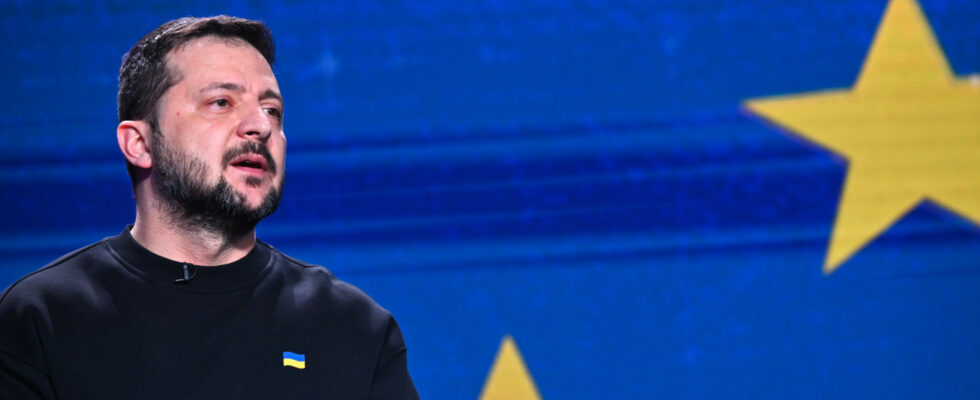Ukrainian President Volodymyr Zelensky warned Tuesday that “no one” could predict the date of the end of the war against Russia, while assuring, despite signs of crumbling Western support, that the United States would not “betray ” Ukraine. The leader held a press conference to take stock of a difficult year, marked by the disappointed hope of a major counter-offensive, followed by the crumbling of Western support and increased pressure from Russia on the forehead.
Faced with a shortage of soldiers on the front, the Ukrainian army offered to mobilize “450,000 to 500,000 people”, he said, an enormous figure for this country. kyiv is seeking to combat the feeling of weariness in the West regarding a conflict that began almost two years ago, but Volodymyr Zelensky has refrained from making any predictions about the duration of the fighting. “I don’t think anyone knows the answer,” not even “our commanders or our Western partners,” he said.
“A very strong impact on the course of the war” in the event of Trump’s return
Last week, Ukraine’s president went on a diplomatic tour to try to get more aid from Washington and the European Union, with no immediate results. The American Congress has not yet validated an additional $61 billion, while Hungarian Prime Minister Viktor Orbán has vetoed the adoption of a new EU aid package. But the United States “will not betray” Ukraine, maintained the Ukrainian president, assuring that American promises would be “respected”.
A few months before the American elections, the president nevertheless recognized that a change in the White House, such as a return of former President Donald Trump, could have a “very strong impact on the course of the war” if it led to a radical change of approach. Saying he wanted to meet the Hungarian leader to “find solutions”, Volodymyr Zelensky also announced that kyiv would soon receive “several” Patriot air defense systems, without indicating their number.
Despite the disappointments, the leader also wanted to salute the successes of his army, and in particular its “great victory” against Russia in the Black Sea. His troops there forced the Russian fleet to retreat with their naval attacks. Despite Moscow’s abandonment of an international agreement to export Ukrainian grain through the Black Sea, kyiv was able to reopen a maritime corridor to export its wheat in particular, ignoring threats of Russian bombing and supposed Russian maritime superiority.
“450,000 to 500,000 people mobilized”
In December, Ukraine also obtained the opening of accession negotiations with the European Union, of immense symbolic significance. Volodymyr Zelensky also gave his press conference in front of a screen projecting a map of Ukraine and an EU flag. But on the front, military successes were rare. The highly anticipated counter-offensive did not allow the hoped-for advance and Ukraine now desperately needs ammunition to hold its lines.
In November, the Ukrainian army was successful in taking positions on the occupied bank of the Dnieper River, but turning this push into a real breakthrough will be difficult. On the contrary, Russia, with confidence despite considerable losses over the last two years, is returning to the attack in the South and in the East. Faced with fatigue and losses of soldiers, the military command proposed mobilizing “450,000 to 500,000 people”, indicated Volodymyr Zelensky.
He said he had not yet agreed, saying he needed “more arguments supporting this idea.” More specifically, Mr. Zelensky said he was opposed to any mobilization of women, but indicated that he could support lowering the minimum age for mobilization of men from 27, currently to 25.
Polls less favorable for Zelensky
Negotiating with Russia in any case remains out of the question for the Ukrainian president, who judged that it was “not relevant” at this stage. His opponent, Russian President Vladimir Putin, also took part in the press conference on Thursday, but in a more favorable position. Invigorated by the concerns of kyiv and the hesitations of the West, the Russian president promised his citizens a victory in Ukraine. The master of the Kremlin, whose re-election in March is presented as a formality, praised the successes of his troops, who “improved their positions” on almost the entire front line.
Volodymyr Zelensky, faced with growing discontent before the start of the war, must also face the resurgence of political tensions. Recent polls show that 62% of Ukrainians trust him, compared to 84% a year ago, when the country was still celebrating the liberation of Kherson, capital of the southern region of the same name.
